Also in today’s trailer bin, stop-motion proves an art remarkably adaptable to the usual Wes Andersonisms in the trailer for the Wes-directed adaptation of Roald Dahl’s The Fantastic Mr. Fox, with George Clooney, Meryl Streep, Owen Wilson, Jason Schwartzman, and Bill Murray. Well, maybe.
Tag: Bill Murray
Days Bygone and Egon.
“He’s cool. He’s jolly. The funny thing is that when I first met him [the Dalai Lama], the Tibetans were all familiar with Groundhog Day, but they didn’t understand the Dalai Lama speech in Caddyshack. They’re like, ‘The Dalai Lama does not play golf.’ I said, ‘I know, I know. But if he did…’“
As part of the Year One roll out, GQ publishes a wide-ranging and worthwhile interview with director Harold Ramis, one that pauses to consider Animal House, Caddyshack, Ghostbusters, Groundhog Day, Meatballs, and the strange headspace of Bill Murray. “Everybody has a Bill Murray story. He just punishes people, for reasons they can’t figure out. He was a student of Gurdjieff for a while, the Sufi mystic. Gurdjieff used to act really irrationally to his students, almost as if trying to teach them object lessons.“
Notes from the Underground.
In today’s trailer bin, Atonement‘s Saiorse Ronan must save her own post-apocalyptic Zion in the new teaser for Gil Kenan’s City of Ember, from the children’s book by Jeanne Duprau (which I’m not at all familiar with). I’m not quite sold by this trailer, but an eclectic bunch is coming along for the ride: Bill Murray, Tim Robbins, Harry Treadaway, Martin Landau, Marianne Jean-Baptiste, Toby Jones and Mary Kay Place.
Limited Appeal.
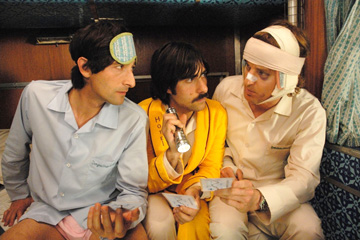
If you’ve ever seen a Wes Anderson movie, you probably already know if you’ll like The Darjeeling Limited or not. For better or worse, this one is right in his wheelhouse — It is to India and trains what The Life Aquatic with Steve Zissou was to Cousteau and boats. I felt pretty much the same about this film as I did about Aquatic — It’s vaguely engaging and mildly diverting at times, but it doesn’t really add up to much, and is basically an excuse for Anderson to parade his usual indulgences for ninety minutes. (Nor is Limited as fresh as Rushmore or as occasionally moving as his best film, The Royal Tenebaums.) I mean, if Wes is your quirky-precious Louis Vuitton bag, don’t let me ruin the fun. But if he isn’t, I suggest taking a plane instead.
Somewhere on the Indian subcontinent, at what passes for rush hour, a flustered American in Organization Man garb (Bill Murray) tries to will his careening taxi through a typically chaotic Third World marketplace, in the vain hope that he can reach his train — the spiffy Darjeeling Limited — on time. Unfortunately for him, this is not his story. Rather, we follow the travails of the three Whitman brothers on this colorful locomotive, who’ve reunited one year after the untimely death of their father to partake in a journey of spiritual bonding. Jack (Jason Schwartzman), the youngest of the three, is currently writhing on the horns of a messy break-up (See The Hotel Chevalier.) Peter (Adrien Brody), the middle brother with a klepto streak, is wrestling with the dilemma of imminent (and seemingly unwanted) fatherhood. And Frances (Owen Wilson), the oldest brother and planner of the trip, is recovering from what looks to have been a self-induced motorcycle accident. (Plus, he’s a bit of a martinet.) These three reluctantly experience the scenic wonders of India at first, spending most of their time quibbling and bickering in fraternal fashion. But, eventually, a tragedy along their travels shakes the trio out of their touristy complacency. And, once they find (a la 3:10 to Yuma) that the train of life can come to an abrupt stop at any time, will the Whitmans then rise above their individual problems and learn the immortal spiritual truth that “brothers gotta hug?” Well, I’ll leave that for you to discover.
And that’s about it, folks…There’s not much else here to speak of. (In fact, the experience of The Darjeeling Limited was almost completely encapsulated by watching the trailer, from the basic outline of the plot to the general mood and rhythm of the film.) I will say that Adrien Brody, fun to watch on most occasions, comes across as right at home in the Andersonverse. And Owen Wilson, whose injuries can’t help but remind us of recent events in his real life, adds a haunted dimension to his character simply by his presence. Still, Darjeeling is a lark — Even with the funeral in the middle going (I’ll let others do the bashing about the dead-anonymous-native-kid-as-plot-point — I’ll confess it did seem a bit off), The Darjeeling Limited has no scene approaching the power of, say, the quietly devastating suicide attempt in Tenenbaums, and no turn as memorable as those of Bill Murray or Olivia Williams in Rushmore. Wes Anderson has shown in the past that he can tell a moving, dramatic story using his signature style. But, Darjeeling is just a rich kid playing with his train set.
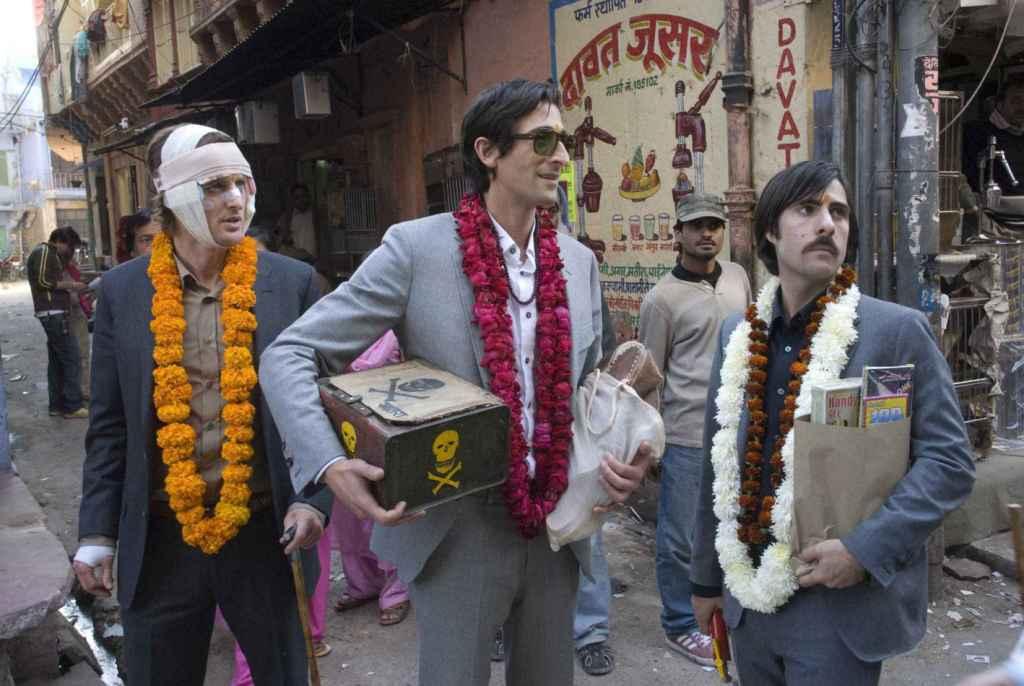
Tintin meets the Tenenbaums.
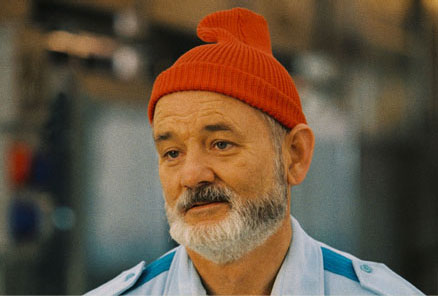 One part Herge, two parts Cousteau, and all parts Wes Anderson, The Life Aquatic with Steve Zissou, alas for Bill Murray’s thwarted post-Lost in Translation Oscar hopes, doesn’t really work. In fact, at times it seems like someone’s parody of a Wes Anderson movie. But, if you dig Anderson’s penchant for artfully constructed shots crufted over with kitsch so precious it’d make Belle & Sebastien blush — and, frankly, I find it mildly endearing — then you’ll probably have a decent time aboard the Belafonte. The movie’s a complete non-starter, but it is a rather pretty and innocuous non-starter, a bland pleasure cruise of a film.
One part Herge, two parts Cousteau, and all parts Wes Anderson, The Life Aquatic with Steve Zissou, alas for Bill Murray’s thwarted post-Lost in Translation Oscar hopes, doesn’t really work. In fact, at times it seems like someone’s parody of a Wes Anderson movie. But, if you dig Anderson’s penchant for artfully constructed shots crufted over with kitsch so precious it’d make Belle & Sebastien blush — and, frankly, I find it mildly endearing — then you’ll probably have a decent time aboard the Belafonte. The movie’s a complete non-starter, but it is a rather pretty and innocuous non-starter, a bland pleasure cruise of a film.
At least the cast appears to be having fun…except for Murray, who’s doing yet another amusing variation of the resigned, laconic, vaguely crestfallen wiseass that’s his signature. I never thought I’d see Willem DaFoe out-ham his turn as the Green Goblin, but by golly I think he’s done it. Cate Blanchett is luminous again, although she (and these seamen) are a world away from The Aviator. Owen Wilson doesn’t add much to the equation (and he’s a bit overexposed in my book these days anyway), but Michael Gambon, Bud Cort, and Noah Taylor are all enjoyable in brief supporting turns.
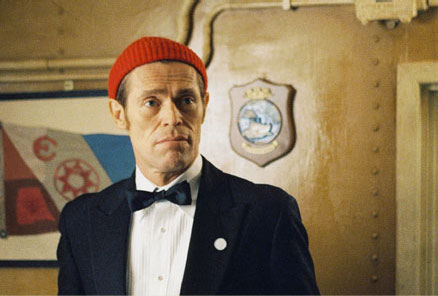 That being said, these actors are all dressed up in authentic Team Zissou gear with no place to go. The story — ostensibly an Ahab-like quest for a carnivorous jaguar shark — never amounts to much, and we are instead treated to a series of episodic vignettes of life at sea (albeit on a boat with a spa, interns, a recording studio, and a Brazilian Davie Bowie fan). Many of these individual scenes are diverting, and I remember smiling through a lot of ’em, but, to be honest, they don’t really add up to a movie. By the time The Life Aquatic starts trying to gain some dramatic headway at the end, it feels forced and unearned. Ultimately too clever by half and probably the least engaging of Wes Anderson’s films so far, Aquatic is cute but not very resonant. All in all, it makes for a blithe but instantly forgettable two-hour tour.
That being said, these actors are all dressed up in authentic Team Zissou gear with no place to go. The story — ostensibly an Ahab-like quest for a carnivorous jaguar shark — never amounts to much, and we are instead treated to a series of episodic vignettes of life at sea (albeit on a boat with a spa, interns, a recording studio, and a Brazilian Davie Bowie fan). Many of these individual scenes are diverting, and I remember smiling through a lot of ’em, but, to be honest, they don’t really add up to a movie. By the time The Life Aquatic starts trying to gain some dramatic headway at the end, it feels forced and unearned. Ultimately too clever by half and probably the least engaging of Wes Anderson’s films so far, Aquatic is cute but not very resonant. All in all, it makes for a blithe but instantly forgettable two-hour tour.
Under the Sea and Over the Top.
In the trailer bin, Bill Murray dives into Cousteau for Wes Anderson’s The Life Aquatic with Steve Zissou (I’m looking forward to the Henry Selick stop-motion stuff, which unfortunately isn’t in this preview), Jude Law gets increasingly overexposed in David Russell’s I Heart Huckabees (Can’t say I think much of this trailer, for some reason, nor of the “existential comedy” billing) and Chris Cooper channels Dubya for John Sayles’s political caper Silver City (Looks solid, but Richard Dreyfuss strikes warning bells…he can get real hammy when doing satire.)
Coronation!

Hail to the King, baby. RotK sweeps the Oscars, winning all 11 categories in which it was nominated. I must say, this is a much better showing than I anticipated, but it is in no way undeserved (Three words for the playa-haters: A Beautiful Mind — Fellowship deserved at least half the awards that that schmaltz-fest won two years ago. Besides, the most contested win this time around was probably Adapted Screenplay, and, even there, none of the other nominees had to straddle such an enormous divide between newbies and a rabidly devoted fan base.) Congrats and many thanks to PJ et al once again. And, in honor of the achievement, the official LotR site has posted the trilogy supertrailer (from the deluxe RotK soundtrack), which is definitely worth a look to get a sense of the sweep and majesty of the films taken together.
At any rate, the entertainment pundits seem to have been bored, but I thought it was just about a perfect evening. The only melancholy note was a brokenhearted-looking Bill Murray losing out to Sean Penn. Both were good, but Penn’s going to be up there every year, while Murray — unless Wes Anderson sets him up with a chewy Supporting Actor morsel sometime in the future — may never get a second chance.
Now, just think how many Oscars the RotK:EE might’ve won…
Academy Fight Song.
And in another campaign news, the Oscar contenders have been announced, with RotK leading the pack:
Best Picture: Lord of the Rings: Return of the King. After three years of waiting, after A Beautiful Mind and Chicago, it’s payback time. Check out the spiffy New Line awards site, featuring some choice RotK clips.
Best Actor: What on earth is Johnny Depp doing in here? I’m a Depp fan too, but c’mon now. At any rate, I’m definitely rooting for Bill Murray for Lost in Translation, but could see Mystic River‘s Sean Penn picking it up too.
Best Actress: Haven’t seen it yet, but Charlize Theron in Monster has all the buzz, and it would take a better man than I to challenge the formidable power of best-actress-oscar-buzz.
Best Supporting Actor: Tim Robbins, Mystic River. I would’ve liked to see Sean “Samwise” Astin get a nod, but am glad that Ken Watanabe of The Last Samurai made it in.
Best Supporting Actress: Renee Zellweger, Cold Mountain, ho-hum. I’m surprised Mystic River‘s Marcia Gay Harden got a nod here after winning just a few years ago. Spread the love, people.
Best Director: PJ for RotK. The only real challenge is Sofia Coppola, and she’ll get hers in the Screenplay category.
Screenplay (Original): A la Quentin Tarantino, Sofia Coppola will win for Lost in Translation.
Screenplay (Adapted): This will probably be one of the few categories where RotK loses out (The best adaptation of the three was Fellowship, and that really should’ve won two years ago.) American Splendor, perhaps? They’re going to want to give something to City of God.
2003 in Film.
Well, it’s that time of year again, New Year’s Eve. So, without further ado…
[2000/2001/2002]
1. Lord of the Rings: Return of the King. If you didn’t see this pick coming, welcome to GitM. Ever since this blog started four years ago, I and it have been breathlessly awaiting Peter Jackson’s trilogy, and, boy, he delivered in spades. Even in spite of the pacing problems mandated by the TE running time, Return of the King is a marvel, the perfect ending to this epic for the ages and easily the best third-movie in a series ever. There’s so many ways these films could’ve turned out atrociously. (To take just three examples, think Brett Ratner doing the Pullman books, or the Wachowskis faltering on the early promise of The Matrix, or how Chris Columbus has made the magical world of Harry Potter so four-color monotonous.) The fact that they didn’t — that they instead shattered all expectations while staying true to Tolkien’s vision — is a miracle of inestimable value. In the post-Star Wars age, when epics have been replaced by “blockbusters,” and most event movies have been hollowed-out in advance by irony, excessive hype, dumbing-down, and sheer avarice, Peter Jackson has taught us to expect more from the cinema once again. Beyond all imagining, he took the ring all the way to Mordor and destroyed that sucker. So have fun on Kong, PJ, you’ve earned it.
2. Lost in Translation. It was fun for a while, there was no way of knowing. Like a dream in the night, who can say where we’re going? I still think Sofia Coppola cut a little close to the bone here in terms of autobiography, particularly given her recent split with Spike Jonze. Still, I find this tale of chance encounters and foreign vistas has a strange kind of magic to it, and it has stayed with me longer than any other film this year. Bill Murray comes into full bloom in a part he’s been circling around his entire career, and while I suspect he’ll get some stiff competition from the Mystic River boys come award-time, I’d say he deserves the Oscar for this one. Lost in Translation has its problems, sure, but at it’s best it’s haunting, ethereal, and touching like no other film in 2003.
3. Intolerable Cruelty. I expect I’ll be in the minority on this pick – This more-mainstream-than-usual Coen joint only got above-average reviews, and hardly anyone I’ve spoken to enjoyed it as much as I did. Still, I thought Intolerable Cruelty was a pop delight, 99.44% pure Coen confection. George Clooney is used to much better effect here than in O Brother (gotta love the teeth thing), and everyone else seems to be having enormous amounts of fun along the way. Light and breezy, yeah, but I thought it was that rare breed of romantic comedy that actually manages to be both romantic and hilarious. In the post-Tolkien era, it’s good to know we can always rely on the Coens for consistently excellent work, and I for one am greatly looking forward to The Ladykillers.
(3. The Pianist.) A 2002 film that I caught in March of this year, The Pianist is a harrowing and unique survivor’s tale that’s hard to watch and harder to forget (and I can’t have been the only person who thought post-spider-hole Saddam bore a passing resemblance to Brody’s third-act Szpilman.) Speaking of which, I said in my original review of Adrien Brody that “I can’t see the Academy rewarding this kind of understatement over a scenery-chewing performance like that of Daniel Day-Lewis in Gangs of New York.” Glad to see I was wrong.
4. Mystic River.: The waters of the Charles are disturbed, something is rotten in the outskirts of Boston, and it’s safe to say the Fates are wicked pissed. Much like In the Bedroom in 2001 (and Clint Eastwood’s own earlier Unforgiven), Mystic River is inhabited and propelled by a spirit of lumbering, impending, inexorable doom…what Legolas might call a “sleepless malice.” It is that existential malice, rooted so strongly in local color, that gives this River its considerable power. And unlike Cold Mountain, where stars stick out here and there with showy turns, the ensemble cast of Mystic River never overwhelm the strong sense of place at the heart of the film — indeed, they sustain it with consistently excellent and nuanced performances. Big ups for all involved, and particularly Tim Robbins and Marcia Gay Harden.
5. X2: X-Men United. Laugh if you want, but I can’t think of any other movie where I had more fun this year. Arguably the most successful comic film since Superman 2, X2 improved over its rather staid predecessor in every way you can imagine. From Nightcrawler in the White House to the assault on the mansion to Magneto’s escape to Ian McKellen and Brian Cox chewing the scenery in inimitable fashion, X2 was ripe with moments that seemed plucked directly out of the comics, if not straight out of the fanboy id. To me, my X-Men.
6. Master and Commander: The Far Side of the World. It’s a long title, it’s a long movie. But a good kinda long…in fact, as I said in my initial review, it seemed to move to the langorous rhythms of a long sea voyage, one that I may not take again for awhile, but one that I still thoroughly enjoyed. And I’ll say this for Russell Crowe…somewhere along the way in each of his films, I tend to forget that he’s Russell Crowe. His Capt. Jack Aubrey was no exception.
7. The Matrix Reloaded. If we can, let’s try to forget the resounding thud on which the Matrix trilogy ended. For a time there, five short months, the fanboy nation was abuzz in trying to figure out exactly where the Wachowskis were going after the second chapter. Previous Matrices, previous Ones? How was Neo manipulating the real world? What was Smith up to? It all seems kinda pedestrian now, of course, but at the time Reloaded was a sequel that outdid its predecessor in pizazz while building on the questions that animated the first film. I won’t defend the first forty-five minutes or the ridiculous rave scene. But, right about the time Hugo Weaving showed up to do what he does best, Revolutions found a new gear that it maintained right up until the arc-twisting Architect monologues at the end. And, as far as action sequences go, it’s hard to beat the visceral thrill of the 14-minute highway chase.
(7. The 25th Hour.) Another 2002 hold-over, and the best film yet made about the aftermath of 9/11, (which only seems natural, given that it’s by one of New York’s finest directors.) Haunted by might-have-beens, what-ifs, and what-nows, The 25th Hour feels real and immediate in its attempt to grapple with both 9/11 and the slamming cage in Monty Brogan’s future. Only once, with the Fight Club-like fracas in the park, does the film flounder. Otherwise, it’s a thought-provoking meditation throughout.
8. The Last Samurai: Breathtaking New Zealand landscapes, furious suicide cavalry charges, rustic untainted pre-modern villages…no, it’s not Return of the King, just the warm-up. [And, as I said earlier, I prefer my anti-modern nostalgia hobbit-like (peaceful, environmental, epicurean) rather than samurai-ish (martial, virtuous, stoic)] While I think Cold Mountain got the Civil War right, I ultimately found this film to be the more engaging historical epic of December 2003. So take that, Miramax.
9. Finding Nemo. Oh, my…I almost forgot about Nemo. (Just like Dory sometimes.) Pixar’s films have been so consistently good that there’s a danger of taking them for granted. They hit another one out of the park in this tale under the sea. As with the Toy Stories and Monster’s Inc. before it, just an all-around solid kid’s movie filled to the brim with eye-popping wonders.
10. Dirty Pretty Things. Although it becomes more conventional as it goes along, DPT starts very well, features a star-making turn by Chiwetel Ejiofor, and manages to include a Audrey Tautou performance that isn’t fingernails-on-the-blackboard bothersome. As with Hugh Grant in About a Boy last year, that deserves plaudits if nothing else.
11. L’Auberge Espagnole. Hmm…two Tautous in a row….perhaps I should stop playa-hatin’. At any rate, while Lost in Translation trafficked in existential detachment, L’Auberge Espagnole showed the fun Scarlett Johannson could’ve been having, if she’d just lighten up and get out of the hotel once in awhile. This paean to the pan-Continental culture of the EU captured the excitement and possibilities of youth in a way that was both sexier and funnier than any of the teen shock-schlock emanating from our own side of the pond. Road Trippers, take a gander.
12. The Quiet American. A bit by-the-numbers, perhaps, but Phillip Noyce’s take on Graham Greene’s novel was blessed with timeliness and two great performances by Michael Caine and Brendan Fraser, both of whom expertly exemplified their homelands’ diplomatic tendencies without becoming overly tendentious. I’m not sure if giving away the end before the credits was the right way to go, but otherwise the film rarely falters.
13. The Fog of War. From Alden Pyle to one of his real-life counterparts, Robert McNamara, who now only remains quiet when questioned about his own culpability over Vietnam. Despite this central failing, a spry McNamara succeeds in penetrating the fog of time to examine how he himself became lost in the maze-like logic of war. If you can withstand the frequent Phillip Glass-scored barrages, it’s worth a see.
14. Pirates of the Caribbean. My initial upbeat opinion on this one has faded somewhat over the autumn and winter months. Still, at the time PotC was a surprisingly good summer popcorn flick, and rollicking fun for about two of of its two and a half hours. Johnny Depp and Geoffrey Rush were great fun, Keira Knightley and Orlando Bloom make for great eye candy, and Sam Lowry was in it. I’m just going to assume it was much, much better than The Haunted Mansion.
15. The Station Agent. Ok, it’s got Sunday afternoon bored in front of the IFC Channel written all over it. And not much happens for the last forty minutes or so. Still, The Station Agent proves that if you write a few interesting, well-rounded, complicated characters and throw them in a situation together, the story almost writes itself.
16. American Splendor. The first of a couple of movies that I seemed to like less than most people. Sure, I thought Splendor was well-done, but it never really grabbed me, and I’d be more impressed by its breaking-the-fourth-wall daring if it hadn’t already been done twenty-five years ago in Annie Hall. (Similarly, I thought this kooky underground comic world was captured better in Crumb.)
17. Spellbound. Could you use it in a sentence? Again, people seemed to love this flick, and I was definitely entertained by it. But, when you get right down to it, what we have here is kids spelling for two hours…I couldn’t imagine ever sitting through this one again. And, as I said in my original post, I thought Spellbound was more manipulative than it lets on. Less kids and more complexity would’ve made the film more satisfying. S-A-T-I…
18. Cold Mountain. I’ve already written about this one at length today, so I’ll just refer you to the review. To sum up, occasionally beautiful but curiously uninvolving and way too top-heavy with star power distractions.
19. 28 Days Later. Great first third, ok second third, lousy finish. The film was much more interesting before our team makes it to Christopher Eccleston’s countryside version of Apocalypse Now. And I can’t stand horror movies where the protagonists make idiot decisions, like driving into tunnels for no reason or taking downers when surrounded by flesh-eating, spastic zombies. But the cast — particularly Brendan Gleeson — do yeoman’s work, and the opening moments in an empty London are legitimately creepy.
20. T3: Rise of the Machines. Before he was the Governator, he was the T-1000 one (last?) time. Let’s face it, this movie is mainly here by virtue of not being bad. I mean, c’mon, it was better than you thought, right? Well, me too. Claire Danes was insufferable, but Nick Stahl and Kristanna Loken give it the ole college try, and the story takes a few jags that weren’t immediately apparent. Bully to Jonathan Mostow for not running James Cameron’s franchise into the ground.
As Yet Unseen: 21 Grams, Bad Santa, The Cooler, House of Sand and Fog, In America, Love, Actually, Something’s Gotta Give.
Best Actor: Bill Murray, Lost in Translation. Sean Penn, Mystic River. Chiwetel Ejiofor, Dirty Pretty Things. Michael Caine, The Quiet American.
Best Actress: Scarlett Johannson, Lost in Translation (who’s sort of here by default…I expect competition from Diane “Something’s Gotta Give” Keaton, Samantha “In America” Morton, Jennifer “House of Sand and Fog” Connolly, and Naomi “21 Grams” Watts.)
Best Supporting Actor: Tim Robbins, Mystic River, Sean Astin, Return of the King, Billy Boyd, Return of the King, Ken Watanabe, The Last Samurai.
Best Supporting Actress: Renee Zellweger, Cold Mountain, Marcia Gay Harden, Mystic River, Patricia Clarkson, The Station Agent.
Worst Films: 1. Gods and Generals, 2. Dreamcatcher, 3. Scary Movie 3. 4. Underworld.
Worst Disappointments: 1. The Hulk, 2. The Matrix: Revolutions, 3. Kill Bill, Vol. 1.
Ho-Hum: 1. LXG, 2. Bubba Ho-Tep, 3. Big Fish, 4. Masked and Anonymous. 5. Tears of the Sun. 6. Veronica Guerin, 7. The Core.
Japanese Whispers.
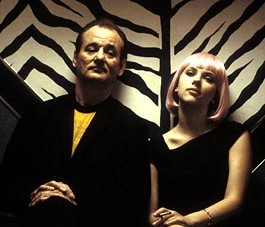 So I finally broke my month-long movieless streak last night with Lost in Translation, an unflinching look at the agony and torment of the human soul that is lying around your five-star Tokyo hotel with nothing to do. I’m a bit conflicted on this one…It’s definitely worth seeing – The film is funny, touching, sweet, often entrancing, and Bill Murray is really wonderful in the lead. It captures the disembodied detachment of travel insomnia and the exquisite anticipation of a newly-made connection in ways that belie the standard Hollywood older-man-meets-younger-woman narrative (Re: mogul wish fulfillment.)
So I finally broke my month-long movieless streak last night with Lost in Translation, an unflinching look at the agony and torment of the human soul that is lying around your five-star Tokyo hotel with nothing to do. I’m a bit conflicted on this one…It’s definitely worth seeing – The film is funny, touching, sweet, often entrancing, and Bill Murray is really wonderful in the lead. It captures the disembodied detachment of travel insomnia and the exquisite anticipation of a newly-made connection in ways that belie the standard Hollywood older-man-meets-younger-woman narrative (Re: mogul wish fulfillment.)
All that being said, I do have nagging problems with Translation. For one, as I alluded above, this story could only have been written by deeply privileged people: I found it hard to empathize with Scarlett Johansson’s Charlotte, who responds to being alone on the far side of the world with all kinds of time on her hands mainly by sitting in her hotel room and feeling miserable. (It makes more sense with Murray’s Bob, who’s clearly seen and done it all by now.)
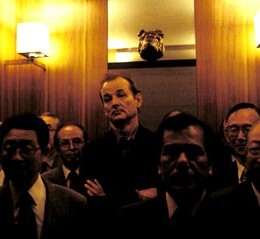 Plus, it often seems like Sofia Coppola is calling out a few hits on people throughout the film. Charlotte’s busy, self-absorbed photographer husband (Giovanni Ribisi) seems less than a degree of separation from Spike Jonze, and the story takes time out to bag on white hip-hoppers (the Beasties?) and film starlets (Anna Faris of May, basically playing a cruel version of Cameron Diaz) in a manner that I found more vindictive than funny. (There’s an exchange involving Evelyn Waugh that – perhaps it’s meant to be this way – makes Charlotte seem deeply unsympathetic, exactly the type of know-it-all snob you wouldn’t want to spend a week in Tokyo with.) In fact, the movie wants to have it both ways – when Bob and Charlotte karaoke classic songs by Elvis Costello, The Pretenders, and Roxy Music (One of the best uses of music since Donnie Darko, even if the choices seem more like Coppola’s than the characters), it’s relationship development…A few scenes later, when the starlet character belts out Carly Simon, it’s a sight gag. Finally, while Translation makes a great postcard for Tokyo, there end up being just a few too many “zany Japanese” engrish jokes and setpieces.
Plus, it often seems like Sofia Coppola is calling out a few hits on people throughout the film. Charlotte’s busy, self-absorbed photographer husband (Giovanni Ribisi) seems less than a degree of separation from Spike Jonze, and the story takes time out to bag on white hip-hoppers (the Beasties?) and film starlets (Anna Faris of May, basically playing a cruel version of Cameron Diaz) in a manner that I found more vindictive than funny. (There’s an exchange involving Evelyn Waugh that – perhaps it’s meant to be this way – makes Charlotte seem deeply unsympathetic, exactly the type of know-it-all snob you wouldn’t want to spend a week in Tokyo with.) In fact, the movie wants to have it both ways – when Bob and Charlotte karaoke classic songs by Elvis Costello, The Pretenders, and Roxy Music (One of the best uses of music since Donnie Darko, even if the choices seem more like Coppola’s than the characters), it’s relationship development…A few scenes later, when the starlet character belts out Carly Simon, it’s a sight gag. Finally, while Translation makes a great postcard for Tokyo, there end up being just a few too many “zany Japanese” engrish jokes and setpieces.
But, not to lose the forest for the trees, I did quite like Lost in Translation. The film is honest and poignant in its depiction of two ships passing in the night, and Bill Murray – almost always good these days – is outstanding. Only once in the film, when he and Charlotte chase the Suntory whiskey bus, did he seem to slip into traditional Ghostbusters-era Bill Murray-dom. The rest of the time, Murray’s a sadder, sleepier, and more resigned fellow than the wiseass we’re accustomed to on the screen. Even scenes with patently unbelievable dialogue (Bob talking to his wife in the bath, for example) are redeemed by Murray here. His performance alone makes the movie worth seeing, and I wouldn’t be surprised if he’s given a nod somewhere come award time.
